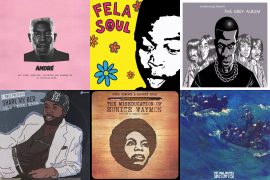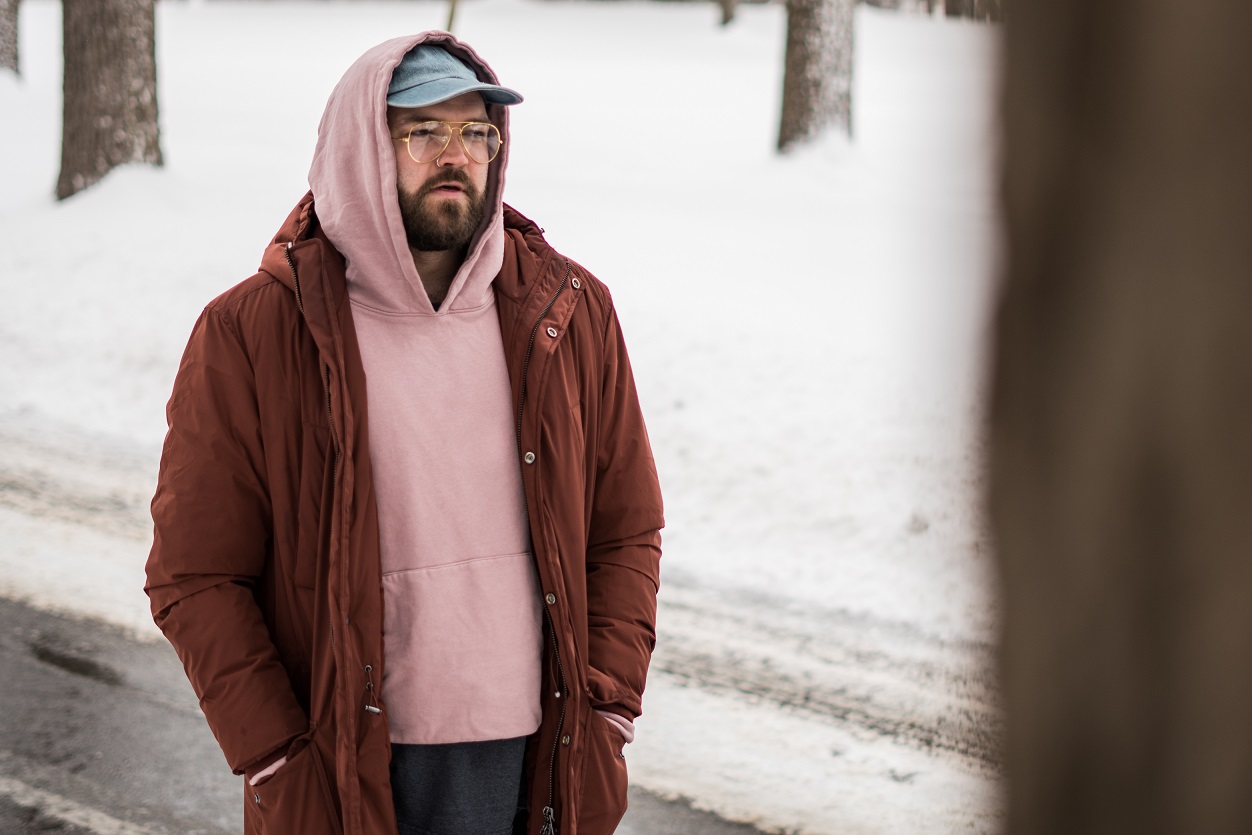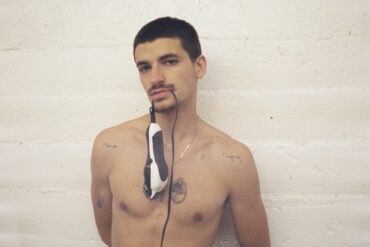The Naked and Famous’ Alisa Xayalith and Thom Powers discuss their fifth album ‘Recover’ and the myriad of significance it has to them.
Stream: “Bury Us” – The Naked and Famous

The 2000s saw more one hit wonders than any decade of music before, leaving artists with the challenge to balance emulating successful work and experimenting in a new direction. On their fifth studio album Recover, out July 24th via AWAL, The Naked and Famous aim to venture into new territory, having become comfortable and experienced in being recognized for those few songs on the radio now a decade ago. As much as they care deeply for their fans- and Alisa Xayalith and Thom Powers do, citing the fans’ reaction as one of the biggest deterrents to moving into a new musical space and sound- the duo is confident that the forthcoming body of work brings something fresh to be appreciated in a different light.
Having teamed up in 2006, the duo eventually became a five-person band, but has since returned to just Xayalith and Powers, with Recover being the first project showcasing themselves without their previous band members.
In a conversation with Atwood Magazine, The Naked and Famous delved into what this new chapter means for them as artists and people, how the living legacy of the band’s seminal debut album Passive Me, Aggressive You has shaped their careers and perspectives, and the overwhelming subjectivity of dedicating your life to music.
— —
:: stream/purchase Recover here ::

A CONVERSATION WITH THE NAKED AND FAMOUS

Atwood Magazine: With your album coming up, I was hoping you two could conceptualize it in your own words; like sort out what the main messages are and what you really hope your fans get to take away from Recover.
Thom: Alisa do you want to take it away?
Alisa: You can because you were late to the party!
Thom: Oh wow. Thank you for asking. The album’s called Recover and it’s really about that. I’ve been writing an essay about it, so I feel like I should be prepared to explain it but it always feels like I’m starting from scratch. It is about recovery for Alisa and I, and the title track on the album, “Recover” was the very first song that we wrote for this album in some ways. It signifies the beginning of something new for us. And also, it’s just an extremely, extremely standout lyrical creation and release. Very exciting. Recover is really about Alisa and I making the decision to carry on with The Naked and Famous. That is one of the big main themes. And then the entire album deals with a lot of healing. A lot of recovery, a lot of picking up the pieces.
You said that the title track was the first one you wrote, and that one sort of pretty poignantly addresses losing one's parents. Is that one shared experience that you have, is that like a more of a metaphorical one? “Recover” stands out in that level of seriousness whereas a lot of the other songs sort of cover a different type of struggle.
Alisa: That song is about grief, I lost my mother when I was a very young girl. Throughout my life, my biggest shows and receiving awards and moments in my career and in my personal life where I truly felt that absence. And that kind of grief, that kind of absence is something I’m always going to be recovering from. My sister and I talk about it all the time, you know, and she had a great childhood. It was very sad because even though she was so happy it was sad that she couldn’t share that moment with her mother. So “Recover” is about recovering yourself from grief and coming out through the other side and ultimately overcoming it on your own. It has a double meaning to it, as Thom and I had been writing this record you know, we’ve written a few songs, and maybe they go on another record we don’t understand yet. And after months of struggling trying to kind of get on the same page creatively “Recover” came along and all the songs that came along after it had some “Recover” in them. It opened up a new pathway for us.
Okay, that makes sense. It seems like a lot of the tracks on this album have to do with, like you said, deciding whether or not to keep the band together but also sort of like a double meaning with romantic relationship struggles. Are those narrative experiences you’re drawing from or is that more of a metaphor for keeping the band together over the years?
Thom: All the songs are super personal. I think we don’t write songs that we like when we when we try to write them in a committee. A lot of people like to write like that, and they have a brief almost as if they’re writing a song that they want to hear whereas It just really doesn’t work for us. It feels so forced and contrived; all of our songs to always have to come from a very real place and real perspective. They have to be autobiographical; it has to have a core, you know? So it has to come from a real experience.
So do you think that sort of aspect has changed in the sense that, obviously that you were a larger group before and now are a duo again? Do you feel like you get to be more personal with your own personalities?
Thom: Well, not really… that’s a good question, but not really because we began as just Alisa and I in 2006 when just the two of us started writing music together and that was the original The Naked and Famous. It’s always been just the two of us when it comes to the songwriting. The writing has always just been Alisa and I and I don’t think that’s changed really. I think the part that’s changed is that we no longer have a committee to lean on when we don’t want know what to do or when they’re having a disagreement. You know, we don’t have this thing to kind of circumvent our fights and we’ve just been a democracy of two. And it can come to a standstill if we’re if we’re not seeing eye to eye. So it makes that part of it difficult but it also makes it a lot clearer and a lot more intentional. Because when we figure out a way through then we see eye to eye and we totally know what we’re doing.
Another thing I noticed about the uniqueness of this album compared to your previous work is it's a lot more intimate with your vocals- particularly Alisa’s since she had more of that signature, almost like shouting but still melodic version of her voice in earlier work and in some of your more your biggest hits. And I was wondering if you had to really practice or do anything differently to change it up and get a lot more of those softer tones that you have on the album.
Alisa: That was something we really wanted to explore on this record because what the band has been known for has been that specific sound and Recover is a chance to show another dimension to these vocals. And not everything has to be the same you know? I can still go there very easily. And I found that that was challenging for me to actually bring it back and reign it in. And that was something that was fun to explore.
Thom: Yeah, I think it was important as well to produce something new. I will put my hand up first and say that I have a difficult time letting go of the things I’ve done that have been successful. And so you know, I think we have been living in the shadow of a song for 10 years. We wrote “Youngblood” and “Punching in a Dream” and just like you said, they both have an iconic range to them. And, you know, I’m someone who sees the value in connecting people. And I never shied away from success in that respect, like those songs really connected with an audience and people who liked them.So I had the reaction to you know, do that again! As a producer, that kind of that feedback system, that reward system, had me wanting to do that again, wanting to repeat myself. It’s difficult to come up with a convincing reason that just, and imagine some sort of very logical or just fairly logical reason to abandon something that’s working. I end up being a “if it’s not broke don’t fix it” -type. It’s not a jump but it is a leap of faith, trying to find a new sound. Because it might not connect. Fans that already loved the band might not like it. And, you know, people will try their whole life to create a sonic identity. And we had one, you know, so it’s risky. It’s a personal risk, and a risk with your fans. But I feel like when we wrote “Recover”, we had this eureka moment, like, oh this is it! And I say that’s the first song that we wrote for this album, but we had other songs that were written prior, but “Recover” was the first song that we wrote where it was written in a day, produced in a day, and felt new, felt fresh and got us into this creative headspace where we were very very productive and then to the bulk of the record is written very very quickly afterwards. So “Recover” was this symbolic piece of art, a symbolic song for us.

So it sounds like the reformation of the band is obviously the biggest experience for you two that led to a new sound. Are there any other cornerstone experiences in your musical or personal lives that really informed the album?
Thom: Yeah, I think they’re actually on the record. There’s a song about nearly dying of food poisoning which is… fun. There’s another song called “The Sound of My Voice”, which is a really, really old song, that’s kind of a standout track in that it’s very separated from the rest of the album. It was it was finished around the same time, but the original demo came a lot earlier. My late friend Scott Hutchinson from the band Frightened Rabbit he committed suicide about a year and a half ago and he helped me finish some of the verses to that song and it was just sitting around. And after he died, I felt really compelled to finish it and turned into something because it was a song about my own struggles with thoughts of suicide and suicidal ideation and depression. And it just became a very, very important piece of that for me. Alisa and I finished it with a friend of ours, and included it in this group of songs. So that song is very unique in that respect that it had a very different journey to this group of things. And it’s, it is the most disconnected from the rest of the music.
Alisa: I feel like there are lots of things that influenced this record… I actually listened to a lot of pop music, and to me listening to a lot of pop music inspired a lot of melodic information that I ended up writing for this record. You can probably find that stuff on our Spotify playlist page.
Thom: Alisa she was asking about life things, you should talk about “Sunseeker.”
Alisa: Oh yeah, “Sunseeker” is like one of those songs that was a reflection of the time that I was living in and am still living in. It’s just a reflection of a happy day and how those can be few and far between but so special. It’s about my dog and she’s been through all the writing sessions and I don’t know what life would be like without having a pet.
Thom: Alisa became a dog mom.
Alisa: I became a total dog mom. Just this morning I was practicing she fell asleep on the couch to fully, fully blissed out. So happy. Yeah, I don’t know. I don’t know how to explain it, or if people can relate if they don’t have pets. But yeah Sunseeker is a really positive, optimistic moment on the record, and I feel like the general mood is a bit of an umbrella thread throughout all of the tracks in some way.
Stream: “Sunseeker” – The Naked and Famous
You can definitely hear the pop in a lot of them for sure, some more than others. But I was also thinking about how you were definitely pioneers when it came to indie pop toward the beginning of your careers and obviously now there are so many more artists in that space and it's still blowing up now. Do you feel like you would describe yourselves as an indie pop? Or do you think like, that doesn't really cut it in terms of genre for you.
Thom: I love that. I think that’s really interesting, thank you. I like that term, do you Alisa?
Alisa: Totally.
Thom: I think indie pop is awesome. Indie pop is like a current playlist on Spotify. And that to me feels like I’m just grateful to be still included. That we haven’t been shuffled off into a category that’s old and aging. So yeah I’m pretty stoked about that.
That’s a cool way of describing it.
Thom: Yeah, and it’s very funny. Like when we first began, we were called a synth pop band. That was getting thrown on us and at the time I remember feeling flattered by it and given some term. But I feel ike when we got that as a label I was really driven to make an album to combat that until I was like, okay, we’re going to do something different. I wanted to produce the album in a very, very organic manner. In two years with touring we wanted to take that and make the second album and be seen as a serious band and not just under the synth pop label. That didn’t instead refer to a group as much, it was more of a sound. So our second album feel’s very monumental in this way because it’s so intentional. And all about the way we started dressing and looking: we were all in black and it felt like we were trying to make a move in a direction. So it’s fun. It’s funny thinking about how those terms can mean so much to someone. Now, I don’t think we care at all, we’re just happy to be included. It doesn’t have that kind of waking effect on us. But I guess that’s the difference between, you know, maybe being in your early 20s and early 30s is that it doesn’t mean that much to you anymore.
Stream: “Death” – The Naked and Famous
Yeah, I mean, I think you covered it but it does seem like artists now, especially indie artists, are really reluctant to hear themselves be called pop. And really reluctant to be put in a box at all. So I think it's like really refreshing that you're not demonizing pop.
Alisa: I think pop music is amazing. There’s so much good pop music that came from before we were even born. And I grew up with it.
Thom: I think as we get older as well, it’s funny like, thinking about having a real snobby attitude to things like music. As I’ve gotten older that has become more and more absurd to me to have my nose up in the air about music, because I realized that it doesn’t really have this inherent value that I thought it did, you know? It’s all context, one song can be art to someone and mean nothing to someone else. I don’t really don’t believe that being in the alternative sphere makes us any more intelligent or sophisticated or intellectual than any another pocket of music. I mean, obviously, certain subcultures have their issues or their influences for what they are. Country music is more related to whiskey and beer. I don’t necessarily think it means that much to be included in a sort of group. So I think that as you get older songs I don’t really feel that pretense that I did when I was younger. I wanted to be alternative because I thought it meant so much. And now I’m like, no I like alternative music more than I like classical music.but I don’t feel the superiority behind it. It seems a bit childish to me for people to have that superiority complex behind the culture they listen to and participate in.

With The Naked and Famous being 15 or so years into your career as a duo, what is something that you'd want younger people starting their career now - songwriters, producers, artists really of any kind - what is some wisdom that you would impart on them?
Thom: Oh gosh, I’d say to never ever listen to musicians or actors when they speak publicly.
Alisa: If I was to give my younger self a piece of advice it’s your discipline is really important when it comes to writing. When it comes to playing…discipline and having fun. Those two things are just so important and I feel like when I was younger I put so much pressure on myself because I wanted to be so good at what I did that I lost sight of what it what it was that I was doing, that I should be wanting to enjoy myself. I never got the discipline and remembering to have fun. Right? It was always one extreme or the other. I think those two things are really important, that’s what I would tell myself.
Thom: I feel like that question I have the least bit of an answer for. The older I get and the more I feel there’s so many things I would wish I could tell my younger self to be wary of. And I think maybe that’s what a bit of wisdom looks like as we get older it’s the center of what you could have done and how you could have behaved. It feels endless to me, it feels like there are so many things that I would love to tell my younger self about how to be present, how to measure things accurately. How to be more realistic, how to have less confirmation bias or have less denial… how to separate my insecurities and my emotions from what was happening in real life. From time to time, mindfulness would have been helpful, I think understanding what anxiety is, would have been helpful. And I think a global perspective what it means to be a musician and a professional musician would have been helpful to start with. For some reason ten years on, you know a decade is like a marker that really means something and this album for us is like a ten-year moment, not an anniversary, but it’s a different kind of thing. Making this album, putting it out, talking about it, and having good reasons to do it has made me think about over and over again, what they meant to me how could we have done it differently? Sorry, the answer’s so overwhelming, it’s such a deep and layered kind of thought.
Yeah, I think that's a great summary of the album and what it means to you and I think a really good note to end on, so thank you.
— —
:: stream/purchase Recover here ::
— — — —

Connect to The Naked and Famous on
Facebook, Twitter, Instagram
Discover new music on Atwood Magazine
? © 2020
:: Stream The Naked and Famous ::








